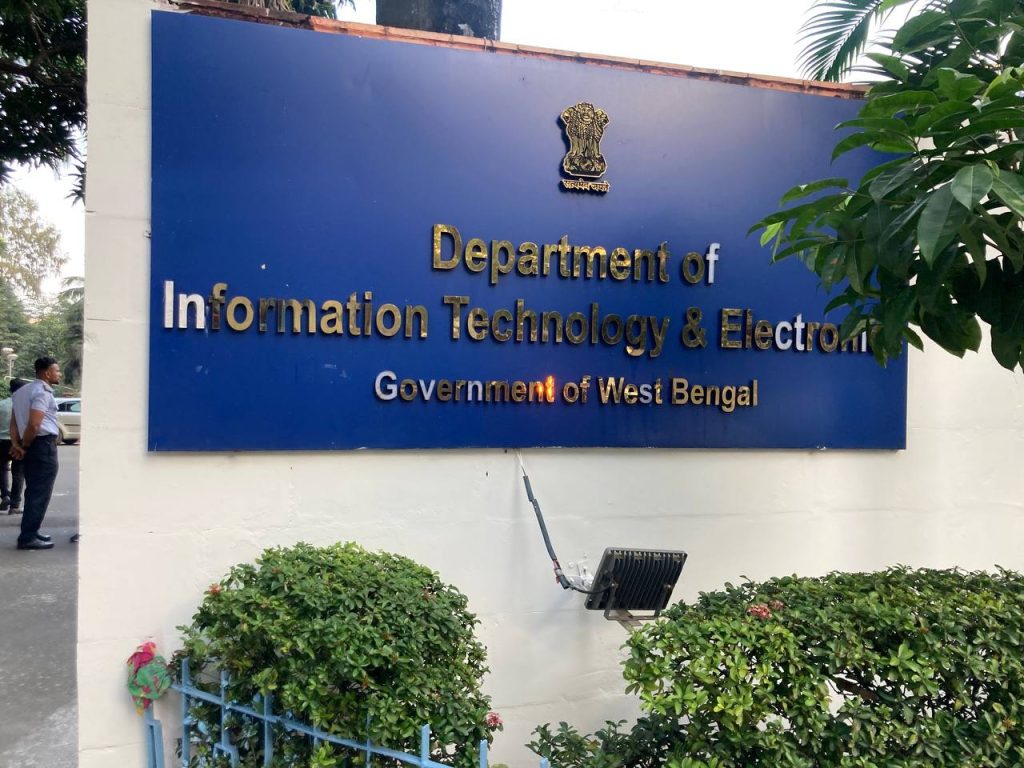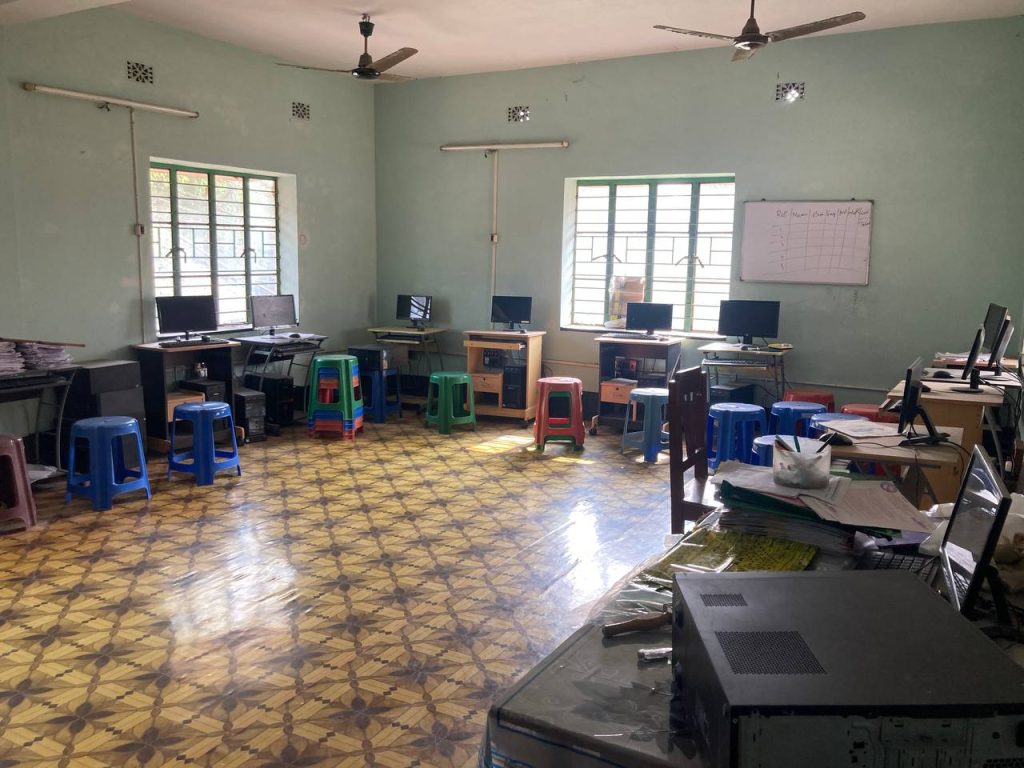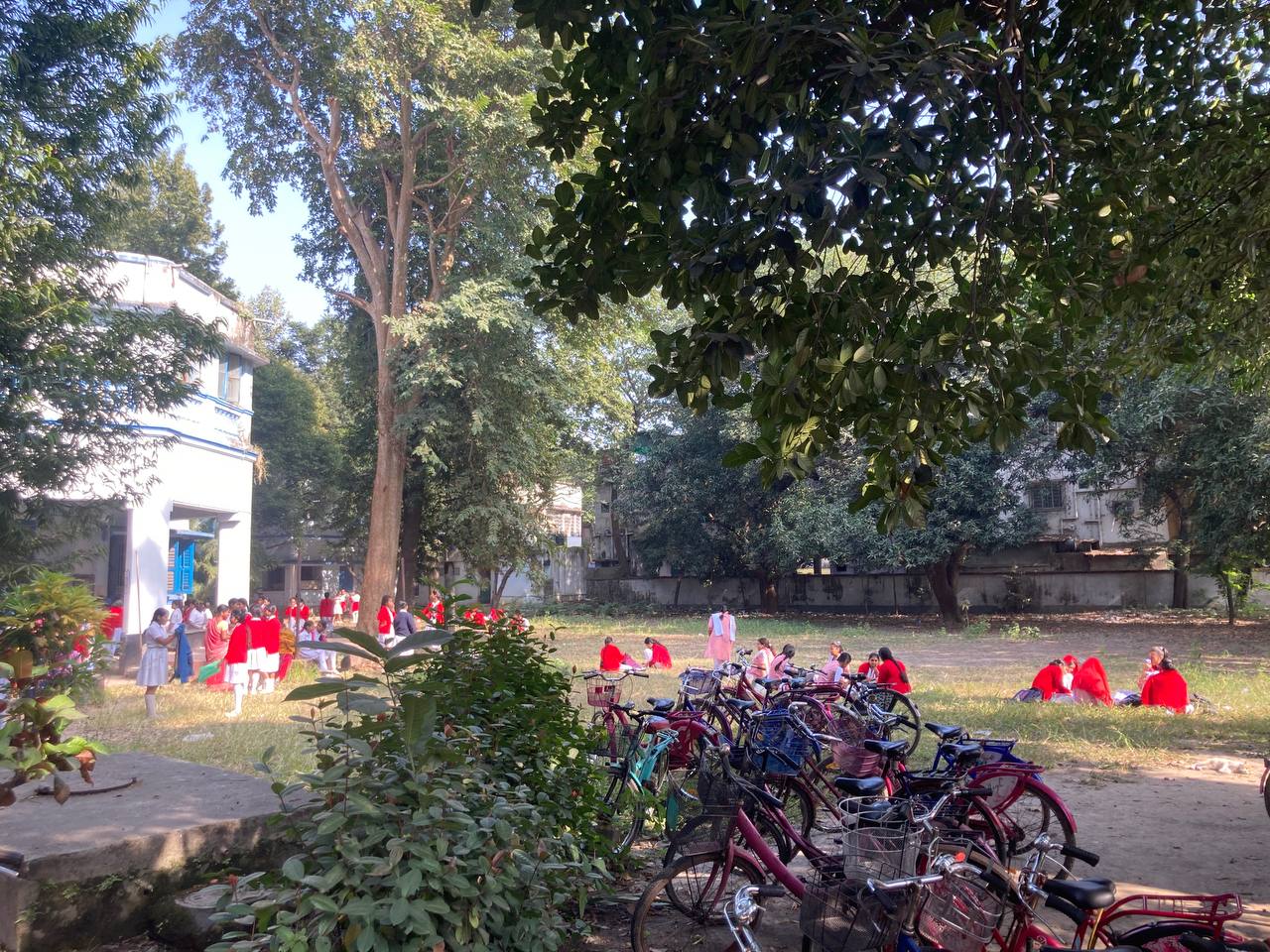Jio dongles provided for the purpose of administrative work to schools stopped working the same year they were installed
by Auhona Mukherjee | Kolkata, January 9, 2024
A man in a blazer and tie sits behind a desk in his office, glued to his phone, in a school in rural West Bengal in North 24 Parganas district. Sk Jamal Uddin is the headmaster of the school. He is not watching reels on Instagram or surfing Amazon for things to buy. He is working on his phone, as he has done for several years.
He handles all the administrative work of the school. This includes providing certificates, marksheets, and giving out scholarships to students from marginalised communities. All of this requires an internet connection. A dongle provided to Rohanda High School by Reliance Jio stopped working years ago, after which he would work on his phone. Frustrated, he eventually used the school’s funds to purchase an internet connection from the local service provider SITI Cable, which costs Rs. 500 every month.
In 2016, Mukesh Ambani, the chairman of Reliance Industries, promised a high-speed internet connection for 63,575 rural and urban schools in West Bengal within two years for administrative work. This programme was rolled out only in 2018 and Jio distributed dongles to over 14,000 schools, according to Sourav Sinha, Deputy Manager at West Bengal Electronics Industry Development Corporation Limited (WBEIDC), the public sector company that works under the Department of Information Technology and Electronics. WBEIDC was responsible for giving a tender to Reliance Jio for the provision of internet services.

WBEIDC works under the Department of Information Technology & Electronics to provide technical support to schools | Photo credit: Auhona Mukherjee
The tender authorised Jio to provide internet connectivity to all secondary and higher secondary schools across the state. Jio connected 14,168 schools but since certain other places lacked Jio connectivity, a new tender was issued. Vodafone acquired the tender to connect 312 more schools. There were still 49,095 schools without internet connectivity.
Jamal Uddin had tried to get his school’s Jio connection activated but was unable to understand the procedure. “There was no one to answer my questions properly,” said Jamal Uddin. “Person A asked me to speak to Person B, then Person B sent me to Person C. This is how it has been.”
The administrative work in the schools deprived of internet connection is usually done on the phones by the staff members, said Pijus Paria, a school inspector in the South 24 Parganas district in West Bengal.
In most schools, the old Jio dongles were provided many years ago and the connections were not renewed, said Anindya Aich, headmaster at Sripur High School. These schools replaced the Jio dongles with an internet connection they set up from the school’s funds, he added.
An email sent to Reliance Jio dated January 3, 2024 remained unanswered.
Reliance Jio launched its SIM card for the first time in September 2016, providing free voice calls and data for three months. They aimed to take over the telecom industry with this move. Since then they have ventured into other products such as fibre optics, phones, and laptops. However, connectivity of their internet services still remains an issue.
In the latest Bengal Global Business Summit that took place in November 2023, Mukesh Ambani promised an additional investment of Rs. 20,000 crore in West Bengal over the next three years. He claimed that Jio’s 5G rollout has already covered most parts of the state.
The Jio dongles are supposed to be switched to fibre optic devices in the coming months as a new tender has been floated by WBEIDC in 2023 which might be taken up by Reliance or BSNL, according to Sinha.
The internet woes of the government schools are not just limited to the teachers and staff members. It affects the students too.
Government school labs in West Bengal are provided with 10 computers each by the state’s Information and Communications Technology (ICT) programme for holding smart classes. This programme, which is also handled by WBEIDC, aims to equip students between grades 5 and 10 with basic knowledge of computers. ICT assigns every school with an ICT school coordinator, however, it has failed to provide high-speed internet for classrooms with most of the schools discontinuing the audio-visual mode of learning.
For instance, Saptagram Sarveswar High School, located 21 kilometres away from Kolkata, has three labs with just one Vodafone dongle having a speed of 60 megabits per second (MBPS). Students in the school have not had a single audio-visual class in the current academic year.

Labs in schools are usually empty and unused as students do not have computer classes | Photo credit: Auhona Mukherjee
In the 2016-17 state budget, the government allocated Rs. 100 crore for the introduction of ‘virtual classrooms’ in a phased manner. These classrooms were proposed to have high-end computers with high-speed internet connectivity, a projector and an audio system for accessing study material within and outside the country. No allocation has been made for this in any of the succeeding budgets.
The number of schools covered under the ICT programme went down from 9,310 in 2022 to 9,305 in 2023.
The situation is no different in Rohanda High School, which receives an internet speed of 20 MBPS through an Airtel dongle provided under the ICT project, according to Muhammad Firoze, the school’s ICT coordinator.
Students in grades five through eight have practical classes using a projector provided by ICT, according to Firoze. Earlier, this included grade nine as well but it was reduced as they could not manage so many students with the limited infrastructure.
A few assistant teachers at the school said that audio-visual classes are not held regularly due to the lack of infrastructure, leaving the students dissatisfied. Sonali Khatun, a grade 12 student said her batch had computer classes only once a week till grade eight and no audio-visual classes for other subjects.
Administrative flaws have posed challenges to the implementation of this scheme. Schools have varying requirements based on their location and condition.
There is no standard operating procedure applicable for all schools and neither is there training for the teachers, said Ashis Kumar Roy, the former Assistant Manager of Projects for Save the Children and currently a consultant for NGOs. There is also a lack of accountability since it is unclear whom the responsibility lies on, he said.
An email sent to the Department of School Education, Government of West Bengal dated January 3, 2024 went unanswered. Isha Mukherji, Joint Secretary, School Education Department of Government of West Bengal told The Bottomline that Jio has provided dongles to schools and government offices across the state, but very recently BSNL has made a proposal that they will provide internet for free for 3 years. Now the places which use Jio may switch to BSNL.
A lot of schools get dongles out of their funds instead of reaching out to the government, she said. Mukherji did not comment on the delay and selective distribution of dongles by Jio since 2018.
In South 24 Parganas district, many government schools face a similar problem. Internet services had to be installed by the school on their own accord in Khanpur Hirendralal Sarkar Girls High School, according to Keya Chattopadhyay, headmistress of the school.
The computers provided by ICT are all Linux-based since it is free, unlike Windows. This is a problem as most of these schools have two labs, one provided by ICT and the other that was set up by WBEIDC before the ICT project. This second set of computers has a Windows operating system. So, students are taught both.
Within a kilometre is Ananda Ashram Balika Vidyapeeth. The headmistress Nilanjana Dutta said their school has requested an upgrade from the Linux devices to Windows, but to no avail.
“It is possible to connect even remote areas if there is willingness and availability of funding,” said Shahid Ahmed, chief operating officer of Digital Empowerment Foundation. If the education department is willing to invest, they can negotiate with the internet service providers and get better connectivity, he said. According to him, West Bengal’s condition of internet connectivity is very poor compared to other states.
Arpita Pal, the ICT coordinator for the school said using Linux poses a practical problem since it is not used anywhere. If the school decides to switch to Windows, ICT would not provide technical support.
“Our hands are tied since technical support is important for us,” said Pal. “We are forced to keep using Linux so that we can get technical support”.
She said students are discouraged by the outdated curriculum and the course should be updated.
“Us teachers should also be given training so that we are updated,” said Pal. “Even we don’t like being stuck in the same place. It feels like we are cheating the students.”

